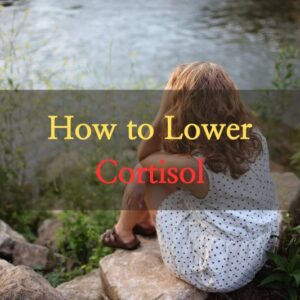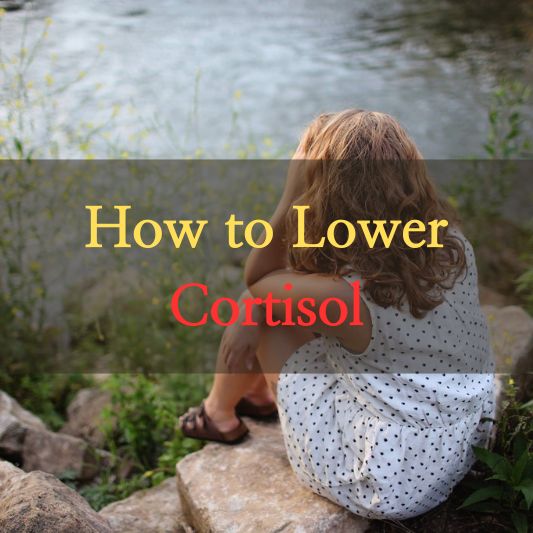In today’s fast-paced world, stress is a constant companion for many of us. Whether it’s due to work, family, or other life pressures, the hormone cortisol, often referred to as the “stress hormone,” can surge to unhealthy levels when we’re under constant stress. Elevated cortisol levels can lead to a range of health issues, including anxiety, weight gain, and sleep disturbances. But the good news is that there are effective ways to lower cortisol naturally and regain control over your well-being. In this comprehensive guide, we’ll explore strategies to help you manage cortisol and reduce stress for a healthier, more balanced life.

Understanding Cortisol: What is it?
Cortisol is a hormone produced by the adrenal glands, which are located on top of your kidneys. It plays a vital role in various bodily functions, including regulating metabolism, reducing inflammation, and managing blood pressure. However, when cortisol levels remain high for extended periods due to chronic stress, it can lead to health problems.
The Impact of High Cortisol Levels on Health
High cortisol levels are associated with a range of health issues, including increased anxiety, high blood pressure, and weight gain. Chronic stress and elevated cortisol can weaken your immune system and contribute to the development of chronic diseases.
Recognizing the Signs of Elevated Cortisol
It’s essential to recognize the signs of elevated cortisol, such as anxiety, irritability, and disrupted sleep patterns. By identifying these symptoms, you can take steps to address your stress levels and reduce cortisol naturally.
Dietary Strategies to Lower Cortisol
Your diet plays a significant role in managing cortisol levels. Incorporate foods rich in antioxidants, Omega-3 fatty acids, and complex carbohydrates to help regulate cortisol. Avoid excessive caffeine and sugar, as they can elevate cortisol levels.
Exercise: Your Natural Cortisol Regulator
Regular physical activity is a potent tool for lowering cortisol. Engage in activities you enjoy, such as jogging, swimming, or dancing, to reduce stress and promote overall well-being.
The Power of Mindfulness and Stress Reduction Techniques
Practicing mindfulness, meditation, and deep breathing exercises can help you manage stress effectively. These techniques promote relaxation and lower cortisol levels.
Quality Sleep for Cortisol Control
Aim for 7-9 hours of quality sleep each night to keep cortisol levels in check. Establish a bedtime routine and create a comfortable sleep environment for optimal rest.
Herbal Remedies and Supplements
Certain herbs and supplements, like ashwagandha and fish oil, have shown promise in reducing cortisol levels. Consult with a healthcare professional before adding any new supplements to your routine.
Connecting with Nature: The Outdoors and Cortisol Reduction
Spending time in nature can provide a calming effect and reduce cortisol levels. Take regular walks in natural settings to reconnect with the outdoors.
Social Support: Your Stress-Reducing Network
Maintaining strong social connections can help alleviate stress. Spend time with friends and loved ones who offer support and understanding during challenging times.
Avoiding Common Cortisol Triggers
Identify and minimize stressors in your life, such as excessive workloads or toxic relationships. Learning to say no and setting boundaries is essential for stress management.
Mind-Body Practices: Yoga and Tai Chi
Practicing yoga or Tai Chi can improve your mental and physical well-being while reducing cortisol levels. These exercises promote flexibility, balance, and relaxation.
Cortisol and Weight Management
High cortisol levels can lead to weight gain, particularly around the abdominal area. Implement a balanced diet and regular exercise to support healthy weight management.
Finding Balance in a Hectic World
In today’s fast-paced society, finding balance is essential. Prioritize self-care, set realistic goals, and remember that it’s okay to take breaks when needed.
Conclusion: Take Control of Your Cortisol Levels
Lowering cortisol levels and managing stress is vital for your overall health and well-being. By following the strategies outlined in this guide, you can regain control over your cortisol levels and lead a healthier, more balanced life.
FAQs
Q1. What are the long-term effects of high cortisol levels?
High cortisol levels can lead to chronic health issues, including heart disease, diabetes, and anxiety disorders.
Q2. Are there any side effects of herbal remedies for cortisol reduction?
While generally safe, herbal remedies can have side effects or interact with medications. Consult with a healthcare professional before using them.
Q3. How long does it take to see results from cortisol-lowering strategies?
Results vary from person to person, but with consistent effort, you can typically see improvements in a few weeks to a couple of months.
Q4. Is cortisol always harmful, or does it have any benefits?
Cortisol is essential for regulating various bodily functions, but chronic elevation due to stress can lead to negative health effects.
Q5. Can cortisol levels be monitored at home?
While there are home cortisol test kits available, it’s best to consult with a healthcare provider for accurate testing and interpretation.
